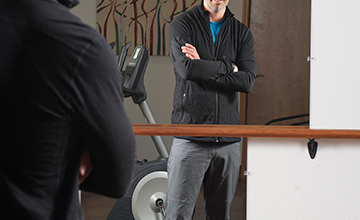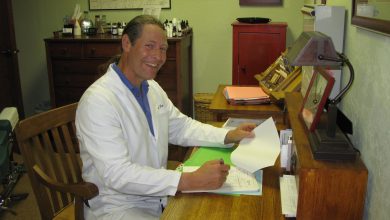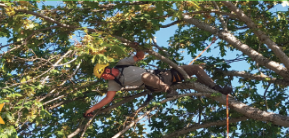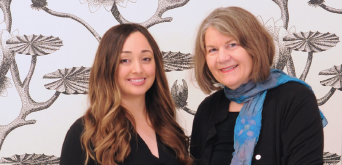“Lisa Rhode: Not your mother’s piano teacher”
As one of Lisa’s adult students, I recently had the pleasure of watching her work with two children who had never touched a piano. I was amazed to see each of them happily playing a song they had already learned by the end of their first lesson with Lisa.
And what’s more, they were eager to do a little concert for me to show off their work. The pieces were fairly simple, but the children were clearly delighted at their ability to play their new instrument! So I took the opportunity to interview Lisa and to share her teaching experiences and philosophy with you.
Hi, Lisa. Thanks for doing this interview. So, how did you get into piano teaching?
I started playing very young, and my mother was my first teacher. I studied privately at first and later attended a local conservatory. I was blessed to grow up surrounded by music: my father started a community orchestra and our house was filled to bursting with instruments. Our parties usually ended with singing around the piano. So I grew up with a strong sense of music’s potential to build community and to create joy.
Believe it or not, I started teaching piano as a way to put myself through graduate school in political science! By the time I finished my degree, I had 25 piano students, and had decided to continue teaching piano as well as to pursue my original career plans. Ever since then, I’ve maintained parallel careers: along with teaching piano, I have extensive experience in training, program administration, leadership development, conflict resolution, and diversity. I’ve now taught piano for ten years, and typically have twenty students.
What kinds of music do you teach?
Primarily classical, but I also introduce my students to jazz, boogie, blues, and ragtime.
What is the secret to helping people (both kids and adults) enjoy piano playing?
My “secret” is that I’m careful to tune in to what works best for each student. I believe that everybody learns in a different way and it’s my job to figure out what that is. And it needs to be fun! I make sure everyone gets solid training in theory and technique, but there are many ways to do that and I don’t follow a rote program.
Some students prefer to learn by ear, others prefer to read the music. Some like to sing along as they play, others like duets. And I encourage all my students to collaborate with me in choosing their own pieces. My experience is that both adults and children find a personalized approach like this very motivating.
Most of my adult students are either learning for the first time or have had unhappy experiences with piano lessons as a child. The first-timers are excited to have this long-awaited opportunity. And for the students who had unhappy experiences as children, my background as a counselor comes in handy in helping them overcome the “trauma” of those early piano lessons!
What has been your most rewarding moment in teaching piano?
Oh my, so many moments…. I’d have to say the most rewarding moment was when the mother of a nine-year-old student told me about her son’s reaction to his grandmother’s death: he spent the day crying and then playing the piano … and then crying and then playing the piano. The mother found it quite striking that he turned to the piano for solace. I was deeply moved to know that a little boy could already find such comfort in music.
I also taught an eight-year-old girl named Petra whose best friend Sophie started taking lessons with me as well. Petra created an entire book of music for Sophie. She made up little songs complete with lyrics and illustrations, and entitled it “Sophie’s First Piano Book!” I was thrilled that Petra poured so much effort into the book and that music had now become a part of their friendship. For their first recital, to my surprise, they dressed as identical twins and played a duet! I still have a copy of Petra’s book in my scrapbook of student memories.
How about a funny moment?
I once taught two sisters whose mother told me they sometimes played a game called “piano lesson.” At the time, I often wore colorful, flowing skirts and dangly earrings. So one sister would dress up in colorful skirts and dangly earrings and play the teacher. Her mother would overhear her using many of the same phrases I typically use, like “good job” and “you did this, this, and this nicely, and now there are just a few things we need to fix.” Apparently they had a whole lot of fun imitating me!
What is your practice philosophy? How can parents keep practice from being drudgery for the kids?
I work with students to help them find a time during their day when it’s realistic for them to practice consistently– and I use the word “play,” not “practice!” I’ve found that no matter what their schedule, most children are home for dinner, so that before or after dinner generally serves as a great “practice slot.” That way, for example, when Mom or Dad is in the kitchen preparing the meal, it’s like a Pavlovian bell: “Oh, dinner’s coming, so now’s my time to play piano.” Parents can help with a casual reminder, but it’s incredibly important not to nag.
Also, I tell both children and adults that the most important thing about “practicing” is simply to play a little bit every day. If a student thinks, “I must play for thirty minutes or else I won’t make any progress,” then it’s easy to feel daunted and just not bother getting started. But for most people, once they sit down, it actually turns out to be pretty easy to keep playing! So the trick is to commit yourself to 10-15 minutes a day, and voila, you’ll get your practicing done! Ultimately, consistency is what counts– even a little bit every day can go a surprisingly long way.
Do you host recitals?
Yes, I offer an annual recital– but I don’t call it a recital, I call it a party– and it comes complete with cake, ice cream, balloons, and party favors! I also offer three cabarets a year. Cabarets are casual gatherings in my home for students only. No parents and no cameras! Everyone can play as much or as little as he or she wants. Students love the cabarets: We play games, we eat bagels and cream cheese, and everyone gets to know each other. Having so many opportunities to play in a comfortable environment is the best way I know to conquer performance jitters!
So how can someone reach you?
People can call me at 541.282.3292 or email me at lisa@lisarhode.com. I also have a website, lisarhode.com, and it’s easy to try me out, since the first lesson is free!




